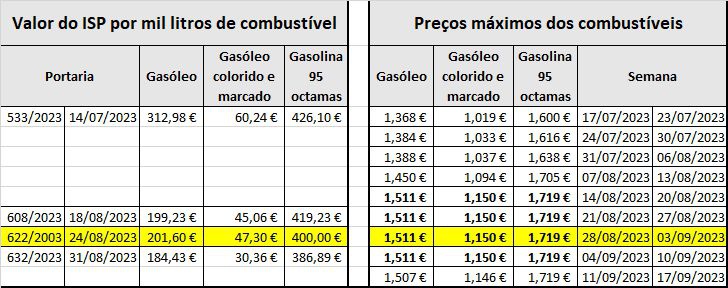Every week, with very few exceptions, on Friday, joint orders from the Finance and Economy secretariats are published defining the maximum prices for 95 octane gasoline, road diesel and colored and marked diesel, to be in force during the week next in Madeira.
Last Friday, in the news from DIÁRIO about the prices to be charged from zero o’clock next Monday, a reader commented: “I bet that around the 24th September the prices (of fuel) will register a drop.” The reference to regional elections is obvious. But is it true that the Regional Government influences fuel prices so that they do not rise before the elections?
To answer this question there is an obvious way: to cross the changes that the Regional Government makes in the rates of ISP – Tax on Petroleum Products, with the prices of fuel practiced at gas stations, in line with the maximum values defined administratively by the executive of Miguel Albuquerque and by Rui Barreto.
Let’s see, what happened in the last almost two months.
On July 14, the Regional Government continued to increase the ISP, in an increase that started in October 2022. At that time (July of this year), prices were fixed at 1.368 euros for diesel for road use, 1.019 for colored and marked diesel and 1,600 euros for 95-octane gasoline.
With the same ISP rates, prices rose until they reached 1,511 euros for diesel, 1,150 for colored diesel and 1,719 for gasoline. It was the week of August 14th to 20th.
The following week, from August 21st to 27th, fuel prices would rise. Then, the Regional Government intervened and significantly lowered the ISP, which allowed prices to remain exactly the same as the previous week.
The following week, according to administrative price fixing rules, diesel fuel should increase in price and gasoline should decrease. So, a week later, the Government changes the ISP rates again – increasing them on diesel and decreasing them on gasoline. This change allowed fuel prices at gas stations to remain unchanged in the week from August 28th to September 3rd.
If there were no further changes to the ISP, last Monday, September 11th, the prices of the three fuels would increase. But, again, a week after the previous change, the Regional Government once again lowered the ISP that charges on the same three fuels, which allowed prices to be maintained for another week, which is still ongoing.

So far, no change has been published to the ISP in force and the maximum fuel prices for the next week, from 11 to 17 September, are already known. The price of gasoline does not change and each diesel fuel drops by less than half a cent per liter.
Thus, it is true that, in the last two months, preceding the regional elections, the Regional Government has controlled the price of fuel, through changes in the ISP, so that there are no increases among the final consumer.

